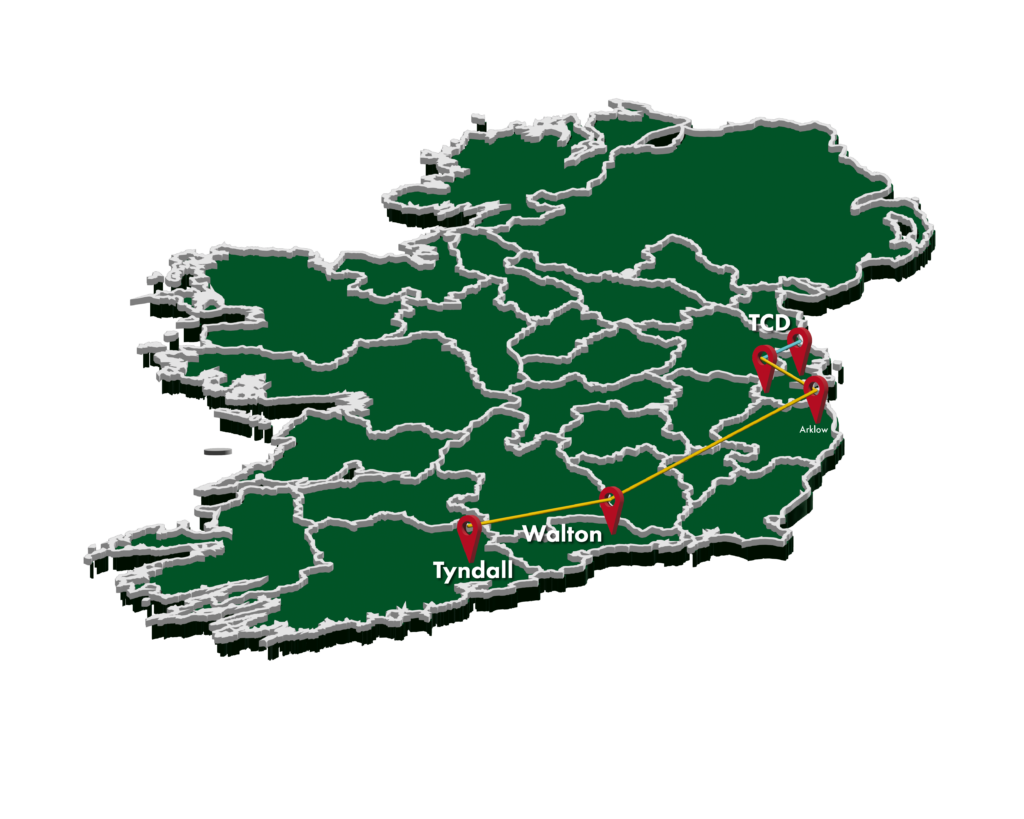Project Overview
Project Overview
IrelandQCI > Project Overview

IrelandQCI: Ireland strengthens the resilience of its critical infrastructure against cyber threats using quantum technologies.
IrelandQCI, as part of the EuroQCI initiative, is co-funded by the European Union under the Digital Europe Programme grant agreement No. 101091520, and the Irish Government’s Department of Environment, Climate and Communication.
The IrelandQCI project aims to deploy advanced national QCI systems and networks in Ireland. The advancement in technologies that will be achieved by the realisation of the IrelandQCI initiative include:
- reinforcement of Scientific and Technological capabilities in cybersecurity,
- improvement of industrial competitiveness,
- strengthening European digital sovereignty
The IrelandQCI team will establish Quantum Key Distribution (QKD) infrastructure along a major network backbone from Dublin to Cork via Waterford using a quantum channel integrated with existing classical fibre systems. QKD is a secure communication method for exchanging encryption keys known between shared parties alone. The communication method uses properties of quantum physics to exchange cryptographic keys in such a way that is provable and guarantees security.
Overview
The €10 million IrelandQCI project is part of EuroQCI, an EU-wide quantum communications infrastructure programme. Researchers will work together to integrate safe quantum devices and systems into Ireland’s communications infrastructure.
Jointly funded by the Department of the Environment, Climate and Communications (DECC) and the EU, IrelandQCI will trial 16 quantum security technology scenarios with key stakeholders across Ireland’s public, industry and academic sectors over the next two years as part of the Irish tranche of the EU-wide EuroQCI programme.
Quantum Technologies are based on the applications of quantum theory, and they are also set to add an extra security layer to Ireland’s communications infrastructure and the data it transmits and prevent it from hacks..
The IrelandQCI team will create an innovative quantum technology ecosystem in Ireland where they can develop and test devices in the quantum network. They plan to educate key stakeholders and the general public about the importance and relevance of quantum technology to our everyday lives and build the quantum workforce in Ireland to future-proof our networks through a series of lectures, training, workshops and visits to quantum technology laboratories.
The ultimate aim of Ireland QCI is to ensure our communications infrastructure is secure and future-proofed against the rising threat of cyber-attacks
Current cryptography is based on large factorization problems which are hard to solve efficiently. By 2023, quantum computers will have sufficient qubits (>1000) to run quantum algorithms such as Shor’s algorithm to solve large factorization problems quickly. The threat is the possibility of breaking encryption systems such as the widely used standard AES256. This puts national infrastructures and security at high risk from cybersecurity attacks which have a catastrophic impact.
The security of current encryption technologies relies on computational hardness assumptions. In the near future advances in computing, combined with ever more sophisticated attacks from different sources, could put at risk the security of telecom and data communication networks. As a result, Europe’s communications networks, and the sensitive data that they transmit could become extremely vulnerable. In order to find solutions to these issues, the European Commission is working with Member States as well as the European Space Agency, towards the deployment of a secure quantum communication infrastructure (EuroQCI) spanning the EU.
Implementation
Quantum communications provide unique capabilities that promise to be valuable tools in data security against cyber threats both classical and quantum in nature. The EuroQCI program seeks to advance operational quantum enhanced networks throughout the European Union. Due to the complex and novel nature of these systems, however, much progress is still needed in moving from small scale deployment and lab experiments to such a large scale production network.
Key Objectives
IrelandQCI aims to address this challenge through the following objectives: |
(1) Establish QKD infrastructure along a major network backbone from Dublin to Cork via Waterford using dark fiber integrated with existing classical fiber systems. In addition, 2 metropolitan networks will connect to public, industry and academic organisations;
(2) Trial 16 quantum security technology advanced use cases with key stakeholders to gather requirements for delivering services underpinning more than 40 Irish use cases. These will be implemented in such a way to support the evolution over time through 3 stages of technology maturation, namely, prepare and measure, entanglement distribution, and quantum memory networks once available;
(3) Create an innovative quantum technology ecosystem in Ireland. This involves establishing testing and engineering facilities for public, industry and academia to develop and test devices in the quantum network and connect with the European integrated photonics pilot line; and
(4) Educate key stakeholders, the general public, and building the quantum workforce. Lectures, training, workshops, and visits to quantum technology laboratories will ensure a large number of trained users.
State of The Art and Limitations
EuroQCI provides an unprecedented way of securing communications and data by integrating innovative and secure quantum products and systems into conventional communication infrastructures. This will be done by enhancing existing infrastructures with an additional layer of security based on quantum physics, in particular quantum key distribution (QKD). IrelandQCI, as part of the EuroQCI initiative, is creating a community of interested national stakeholders, to gather expertise and share knowhow on the application of quantum technologies, which will be utilised in this project.
